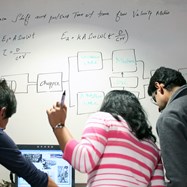University admissions
31 January 2016
Responding to the Government's announcement about university admissions transparency, Dr Wendy Piatt, Director General of the Russell Group, said:
"Ensuring our doors are wide open to talented and able students from all backgrounds really matters to Russell Group universities. And real progress has been made over the last five years with big increases in the number of black and minority ethnic students attending our universities.
"Between 2010 and 2015, the number of Black students starting courses at our universities rose by 62%, the number of Asian students rose by 28% and the number of mixed ethnicity students rose by 43%. In addition the number of students on free school meals going on to a Russell Group university has doubled in the last 4 years.
"But we are far from complacent. Russell Group universities spend hundreds of millions of pounds on outreach activities in schools and colleges and on bursaries and scholarships that support disadvantaged students through their degree course.
“Universities already publish the kind of data that the Government have called for through UCAS, the Higher Education Statistics Agency and on their own websites. We want to ensure the admissions process is as clear and easy-to-understand as possible. We look forward to discussing what more information could be published to aid transparency.
"While our universities invest a huge amount of time, effort and resources into improving the situation, they cannot solve this problem alone. There are still far too many children from disadvantaged backgrounds underachieving at school and receiving poor advice and guidance. It will take time, commitment, and sustained action from a range of agencies to raise pupils' aspirations, increase attainment and improve the advice and guidance offered."
Notes to Editors
- According to the UCAS End of Cycle 2015 report (which details university applicant and acceptance rates for entry in September 2015):
- The number of Black students accepted by Russell Group universities has increased by 62%, from 1,690 in 2010 to 2,740 in 2015.
- The number of Asian students accepted by Russell Group universities has increased by 28%, from 7,285 in 2010 to 9,350 in 2015.
- The number of Mixed ethnicity students accepted by Russell Group universities has increased by 43%, from 2,760 in 2010 to 3,940 in 2015.
- Department for Education destination data published last week showed that the number of students eligible for free school meals going to Russell Group universities has increased every year since 2010. In 2013, almost 13% of school-leavers (1820) eligible for free school meals who progressed to higher education went to study at a Russell Group university, up from 7.5% (910) in 2010.
- Students eligible for free school meals (FSM) are more likely than ever to attend highly-selective institutions. In 2014 FSM-eligible pupils were 39% more likely to enter high tariff institutions than they were in 2011.
- In 2016-17, the 20 Russell Group universities in England alone will be investing £243 million in scholarships, fee waivers, bursaries and outreach activities aimed at the most disadvantaged - with additional investments being made across Scotland, Wales and Northern Ireland.
- Extensive data on the applications process and demographics of the student bodies at universities are already published by UCAS, HESA and by individual universities. For example, Oxford and Cambridge publish detailed breakdowns of application statistics on their websites here and here, respectively.
- Students eligible for free school meals are significantly less likely to achieve 5 or more A*-C grades at GCSE including English and Maths than their more advantaged peers (33.1% vs 60.9% in 2015 according to DfE data published last week). They are also significantly less likely to achieve the EBacc than their more advantaged peers (9.9% vs 26.6%).
- In 2015, only 16% (1130) of the 7115 18 year old UK domiciled Black students applying to HE with three or more A-levels had grades AAB or better. This compares to 32% of white applicants.
- In 2011/12 only 3.5% of A-level students from Black backgrounds achieved three A*-A grades. This compares to 26.9% of Chinese students, 11.1% of Mixed Race students, 10.2% of White students, and 9.5% of Asian students.
- Fewer than 8,500 students eligible for Free School Meals in 2010/11 took three A-levels. Of these students, only 546 achieved three or more A* or A grades.
- The Russell Group Opening Doors report and accompanying films examine the root causes of under-representation of students from disadvantaged backgrounds, and gives examples of what Russell Group universities are doing to help tackle the problem.
-
Hamir Patel
hamir.patel@russellgroup.ac.uk
020 3816 1316
-
Hollie Chandler
Hollie.Chandler@russellgroup.ac.uk
020 3816 1307
 X
X

